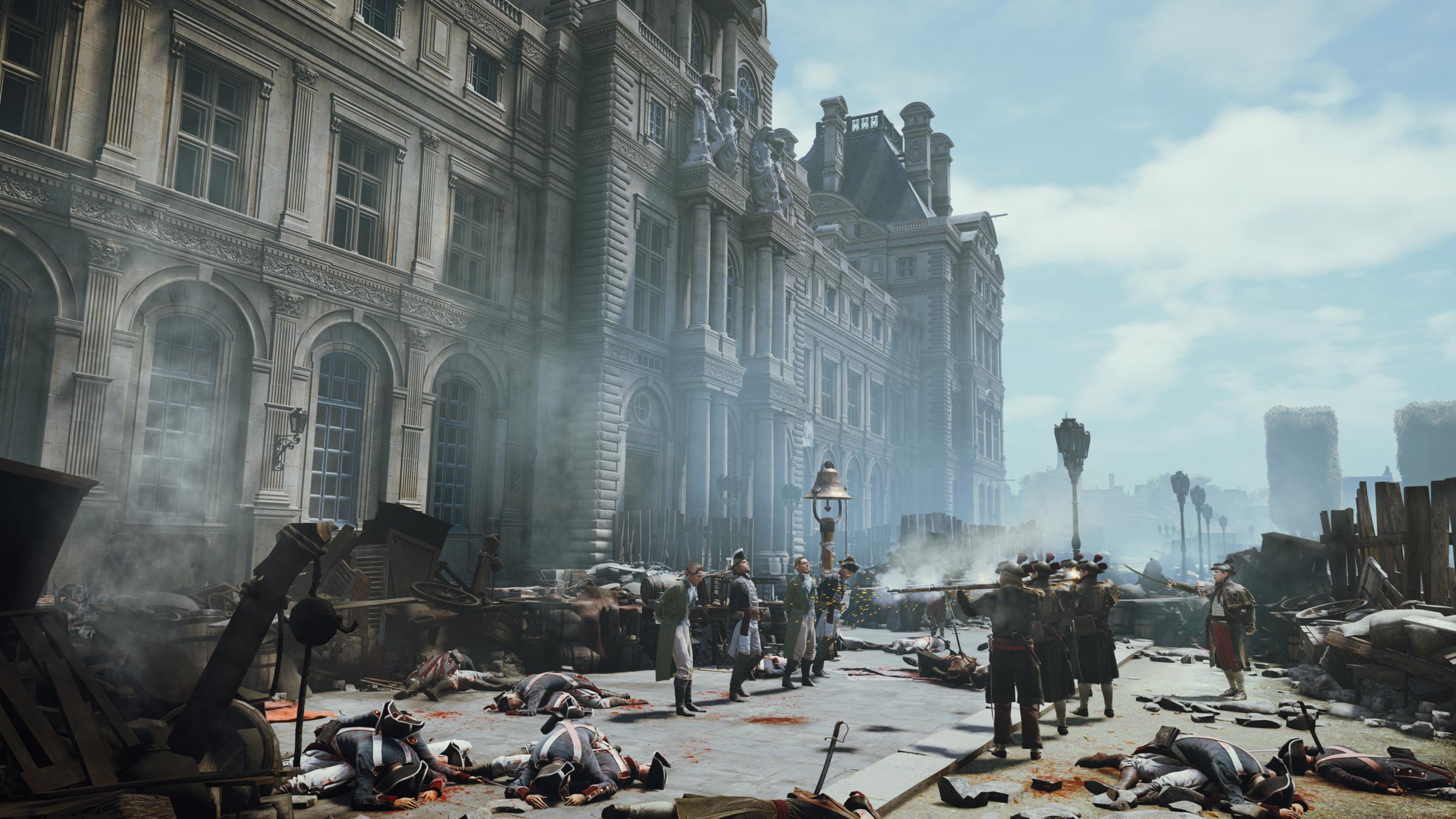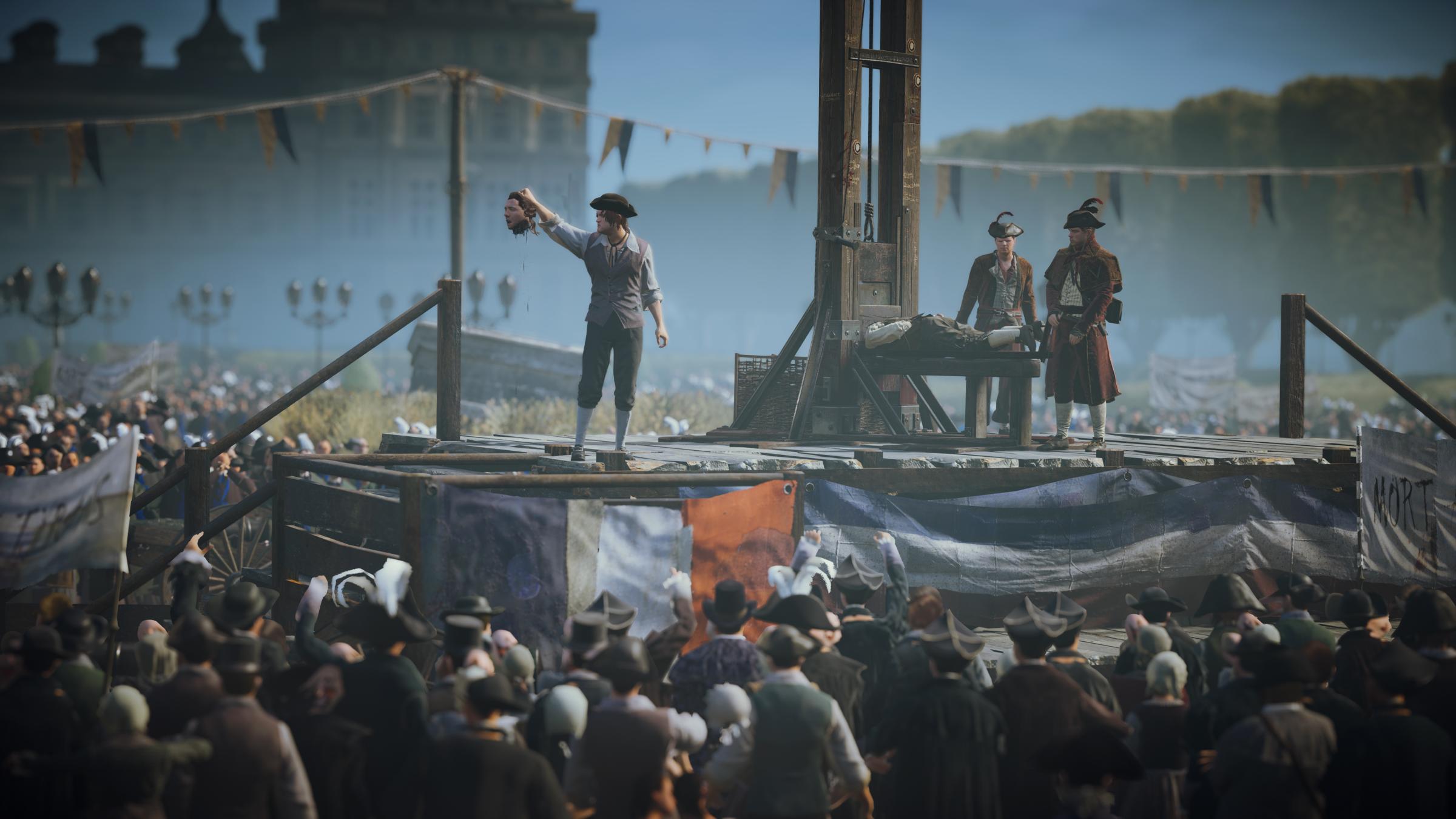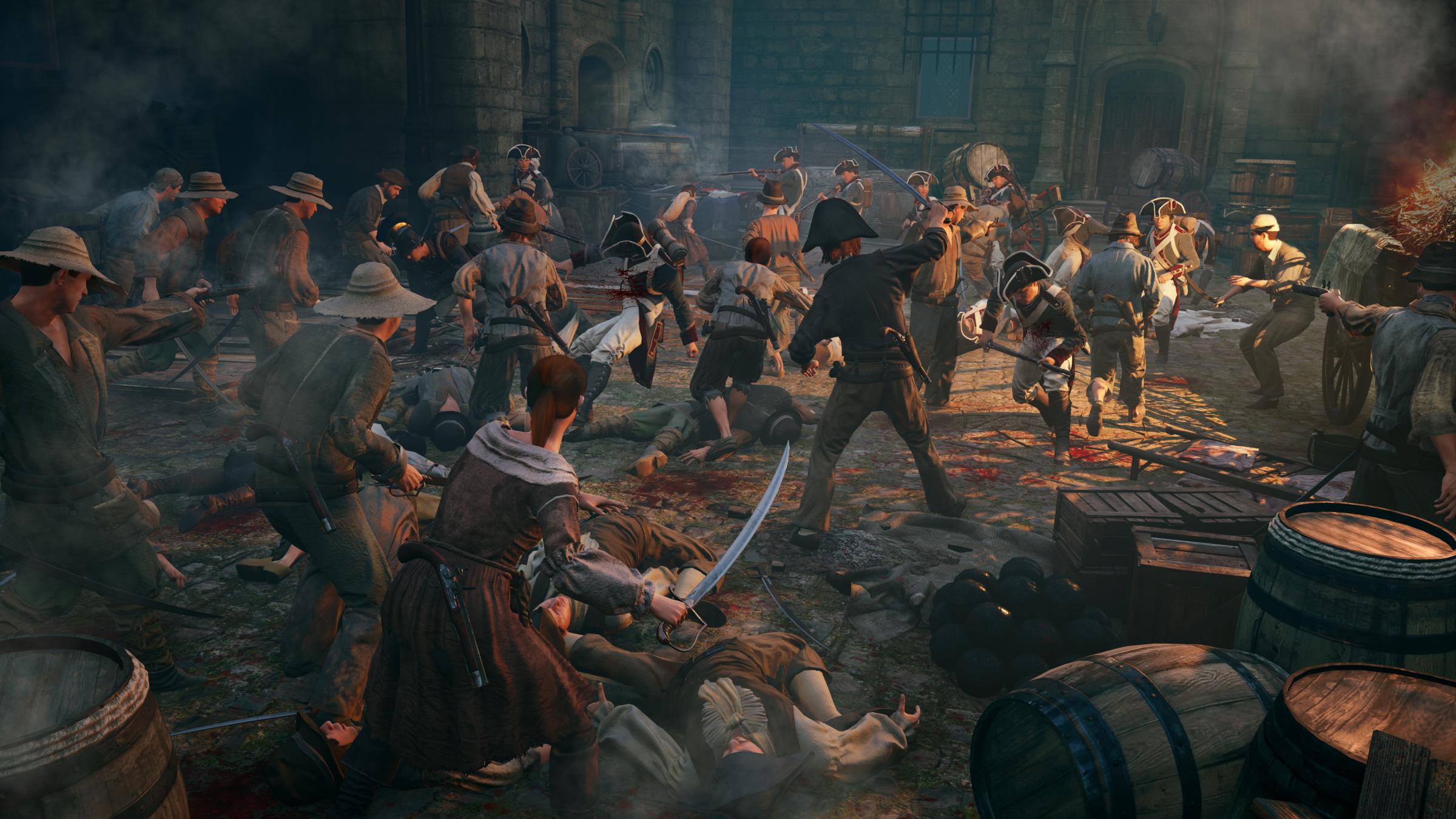“[Just] as the French revolution … understood itself through antiquity, I think our time can be understood through the French revolution,” said Scottish poet Ian Hamilton Finlay, in a December 2001 Jacket interview.
Indeed, the French Revolution is one of these ever-topical historical periods brimming with controversies and lessons. It resonates across the political spectrum, and artists have explored it in countless books, movies, paintings, musicals, musical works, plays and more.
You can add games to that lineup on November 11, when Ubisoft’s Assassin’s Creed Unity rolls out the most elaborate interactive simulation of the tumultuous time yet conceived.
It’s not a political game in the sense others that grapple with events like the Israeli-Palestinian crisis or food imports in the U.S. head-on are sometimes described. But the label or category “political game” can be misleading. It suggests there’s such a thing as a nonpolitical game. That’s a misnomer. Even a game as inocuous as Pac-Man can have political implications, and positioning a book or film or video game as apolitical, say for commercial purposes, to avoid alienating potential buyers, is as political a maneuver as any other.
Assassin’s Creed III tried to square this circle by relegating its political commentary–some of it witheringly critical of American historical revisionism–to optional encyclopedia entries. The trenchant stuff was there, but mostly happened offstage.
Where does Unity sit on that spectrum? Does it dig into the French Revolution’s political ramifications directly, or circle the periphery? I put the question to Unity director Alexandre Amancio late last week. Here’s what he told me.
We’ve already seen the series’ ethical framework shaken in recent games, with storylines that question both the Assassins and Templars’ motives. Is Assassin’s Creed Unity a continuation of that degree-by-degrees shift, or a more radical rethink?
I think Assassin’s Creed Unity takes things even further than we’ve seen to date. I think the French Revolution is the perfect setting for that ambiguity, because if you look at the French Revolution itself, the idea behind it is obviously that this is one of the first populist movements, when the people revolted against this old-school autocratic society. But the way the French Revolution proceeded, up to the Reign of Terror, you can definitely see how something that starts off as a genuinely positive idea can turn into a bloodbath and chaos.

You’ve described protagonist Arno’s story as a redemption quest. Redemption from what?
At the beginning of the game, Arno’s adopted father dies, and the father happens to be the Grandmaster of the Templars in France. And because of certain details surrounding this death, Arno feels somewhat responsible.
So joining the Assassins is a means to an end for Arno. By joining the Assassins, he feels he has a better chance at redeeming himself for this mistake. That may sound counterintuitive, because if you want to avenge the death of a Templar, you wouldn’t join their enemies.
The thing is, and this goes along with your question about moral ambiguity, that the Templar Grandmaster is murdered because of a plot within his own order. There’s an extremist movement that causes a shift in leadership, so it’s sort of a coup. And part of trying to figure out who was responsible for the death ties into finding out who actually murdered the Grandmaster and why the Templars are shifting ideologies, but it’s also mixed in with the French Revolution and who’s pulling the strings behind both things.
This is how we tie Arno’s redemption quest in with the Revolution. A lot of the elements we see in the French Revolution we try to echo and mirror through metaphor. It’s the idea of extremism and how if you take two separate political entities and you take them to extremes, they wind up looping back and becoming the same thing.
You see this especially at the beginning of the story, where the Assassins and Templars are getting a little closer, because they’re figuring that the state of France is hitting such a critical point that it might explode. So by maybe moving toward detente and working together, maybe they can prevent the situation from deteriorating into a bloodbath. But what you see is that there’s elements on both sides who’d rather see society crumble, and so the game is sort of a study of that.
Speaking of the factions, if we’re thinking on the grand scale of human history, specific political ideologies tend to be short-lived. Creative license aside, isn’t it stretching the bounds of plausibility to portray the corruption-obsessed Assassins and control-obsessed Templars as these ideologically cohesive movements for millennia?
The more you play on these high-level universal truths and the more you tie them to different areas of the narrative, whether it’s the character’s personal story or history itself, or the events, the more I think they start to permeate the whole experience. I think that’s how you build a deeper and more satisfying experience, where it’s not just surface and touches every part of the fabric of the narrative.
The Assassins certainly go through that. I think that’s reflected through Arno. Arno’s character arc is a reflection of the Assassins’ progression, from the beginning of the revolution to afterward, and how he understands the truths that were told to him at the beginning.
Any time you read scripture, you’re always responsible for interpreting it in a certain way. So the same text that you read before and after a traumatic event might have a totally different meaning. Y0u might realize that something you thought was an absolute truth at one point in your life, after certain trials and tribulations, you look at that same phrasing and you see in reality that it meant something completely different.
This is Arno’s character arc. It’s about the meaning of what it is to be an Assassin, and what the tenets of the Assassins truly mean. The reason we did this is that it’s a renewal for the series and a new beginning for the brand. It felt like this study of what it means to be an Assassin was very important for new players as well as those who’ve been playing the story for a long time.

Now if you look at the Templars, you have a similar thing going on, but with a different take altogether. The idea is that if you look back at the historical Templars in the Middle Ages, there was a great betrayal, a purge of the Templar order executed by Philip the Fair [Philip the IV, king of France in the late 13th century] and the Pope [Clement V]. This was the historical end of the Templars. And if you look at what Jacques de Molay [the last official Grandmaster of the historical Templars] was actually doing, he was already shifting the world toward something else. He thought that autocratic control was not the way to go, because people are always going to rebel against control and seek freedom. Even if the Templars believed people needed to be controlled, he understood you will never be able to change human nature.
So he was shifting the order toward something else, like a banking system, maybe something where people would control themselves if the system was built to reflect human nature. And if humans could regulate themselves, maybe it would be much easier to control things. But before he was able to undertake this, there was a betrayal and the Templars were purged.
What we’re seeing in Assassin’s Creed Unity, is somebody rising up, finding these old texts and realizing this guy was a prophet, that he was centuries ahead of his time, and this is what has to be done, and that the French Revolution might be the perfect setting to pull the strings and shift the world from something involving autocratic control to something more governed by desire and money and the economy.
How politically pointed can you afford to be in a game that’s part of a multibillions franchise, played by players of many political persuasions? How corporate-beholden are you to keep the political implications of this plot point or that one anodyne?
Very little, because that only becomes delicate when you want to take a strong position with a certain kind of view.
What we actually try to do, and I think this is just a personal belief that we have, is to avoid reducing history. You can’t start taking sides, because that makes it biased, and what we’re really trying to do is expose every slice of history in the most unbiased way possible.
It’s obviously incredibly difficult. History is always subjective, because it’s written by people, and no matter how objective you try to be, human nature makes it subjective. We try very hard to portray things as factually as possible. But for instance, we discovered that the French Revolution even today is controversial. Historians and specialists of the period don’t agree with everything and every event. We consulted with two historians on the project. We had a full-time historian on the project, but we worked specifically with two people known in French Revolution scholarship circles, and we had them review the entire script. And we noticed that even between them, there were things about which they didn’t agree. One of them thought that portraying a certain event in a negative way was positioning us in a Royalist category, for instance. You know, the September Massacres are called the massacres and not “the jubilation” for a reason, right? However well-intentioned the initial purpose was, the fact remains that it was a time of chaos.
So they weren’t always in agreement, but one thing the historians were in agreement about was that we portrayed the French Revolution in the game in a very objective way. They felt it was faithful to the gray area of this period. The very fact that our narrative is not about something that’s moralistic in the sense that we’re not forcing you to side with a certain camp expresses this. Our story is about individuals, about how these events take them down a road where they’ll learn things about themselves and their own views. We’re not trying to expose the evils of society and say these people were wrong, these people were right.
If anything, what we end up saying is that everybody was wrong. It’s a human thing. We believe in a certain truth or certain ideals, and then because we’re protective and convinced by these ideals, we fall into the trap of taking them to extremes. And the thing is, most often the truth’s somewhere in the middle. If anything, we’re trying to say people should try to keep a more open mind about the other side’s position on the political spectrum.

You’ve also said that in Unity, unlike in Assassin’s Creed III where as Connor you were involved in or even instigating pivotal events in the American Revolution, that’s not what you’re up to as Arno. You’ve called Unity more a romance that happens to be framed by the Revolution. But romances are really, really tricky to pull off in any medium without botching the chemistry or coming off as oversentimental. I can’t think of a non-indie mainstream game that’s really done it.
You’re absolutely right. When you’re making a game about anything emotional, cinematics are your way of telling the narrative. The thing is, when you’re watching a cinematic in a game, you’re removed from the core of the experience, which is your input with the controller.
You mention indie games, and I think there are some that have succeeded in having you really experience emotion or feelings for NPCs when you’re playing the game by generating those things through interaction. The reason a shooter is visceral is because the movement and pressing of the button is exactly reflecting the emotion you’re trying to convey, say stress, adrenaline and so forth. Every time you’re able to provide input through the controller and directly reflect the emotion you’re trying to convey, it works. On the other hand, when you’re asking the player to be passive in watching interaction between characters on screen in a cinematic, of course the player’s going to feel removed, because games aren’t films.
What we tried to do is make the romance, as much as we could, happen during gameplay. Of course there are some cutscenes where a little bit of exposition takes place, but that’s inevitable. We really try as best we can to have the characters interact during gameplay. I think that’s how you get players to feel something in a video game.
Now another thing we did is the fact that, because the nature of a romance story is the interaction between two characters, and usually the gameplay is about you stabbing people or sneaking around the world, it makes it very difficult to do romance as something other than a side element. But because we made Arno’s romantic interest, Elise, a Templar, because she is from a different faction than the player, all of a sudden that makes it more relevant. Even if their ultimate goal is the same, because she’s affiliated with the losing part of the Templars, the one that got purged, their methods might differ, and their motivations certainly differ.
I really like opposites, and I like exposing the opposites, because I think that it’s through showing the opposite of something that you can strengthen what you’re trying to convey. Elise is motivated by a desire for vengeance. Arno is motivated by a desire for redemption. These two things are very different, because one ultimately leads to your doom, while I think the other can lead to you actually being saved.
By making their objectives the same, but their motivations opposite, hopefully their interactions will create tension, and players will feel this impossible decision and the inevitability of the relationship as they move forward. Ultimately the romance part of this game is a Cornelian dilemma, where Arno is stuck in this impossible decision, where he ultimately has to choose between the values of the Creed and his love for this woman who happens to be on the opposite side of the spectrum.
More Must-Reads from TIME
- Why Biden Dropped Out
- Ukraine’s Plan to Survive Trump
- The Rise of a New Kind of Parenting Guru
- The Chaos and Commotion of the RNC in Photos
- Why We All Have a Stake in Twisters’ Success
- 8 Eating Habits That Actually Improve Your Sleep
- Welcome to the Noah Lyles Olympics
- Get Our Paris Olympics Newsletter in Your Inbox
Write to Matt Peckham at matt.peckham@time.com